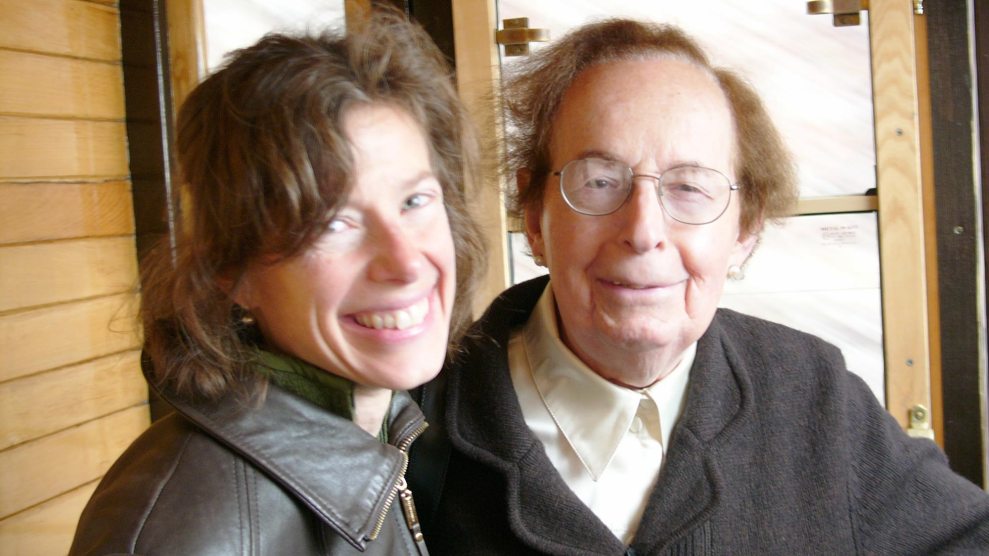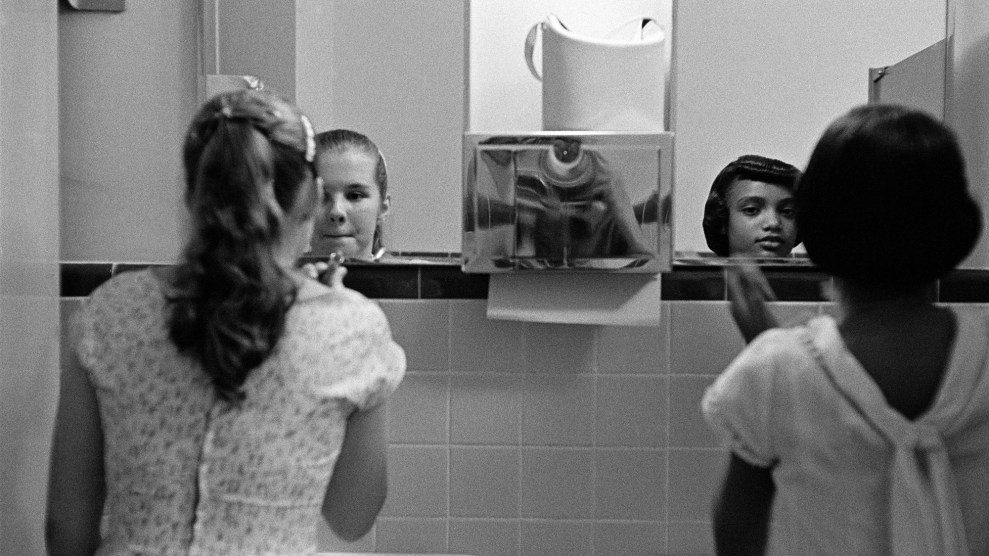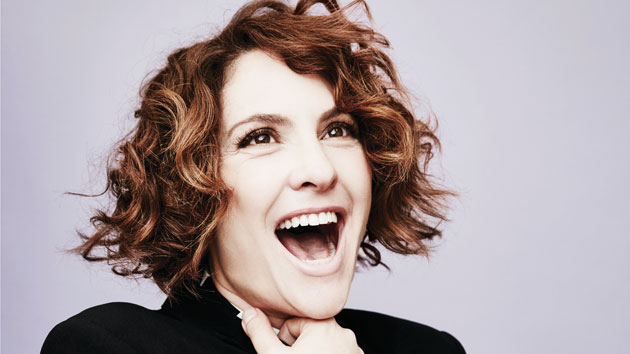
Susan Faludi with her late fatherRuss Rymer
In 2004, a decade or so before Transparent debuted and Bruce Jenner came out as Caitlyn, journalist Susan Faludi—author of the 1991 bestseller Backlash: The Undeclared War on American Women—got an email from her 77-year-old Hungarian father. He’d moved back to Budapest after a long career as a photographer in the United States, and the two had “barely spoken” in 25 years. “Dear Susan,” the message read, “I have some interesting news for you. I have decided that I have had enough of impersonating a macho aggressive man that I have never been inside.”
Her father had gone to Thailand, undergone sex-reassignment surgery, and was no longer Steven Faludi, but Stefánie. His announcement marked the beginning of an extraordinary father-daughter reconciliation and a personal exploration of gender fluidity that culminated in Faludi’s latest book, In the Darkroom. I caught up with Faludi to talk about gender extremes, her own identity crises, and what post-Soviet Hungary has in common with Donald Trump’s America.
Mother Jones: Your book title works on several levels. The first refers to your father’s profession as a photographer. Let’s talk about the others.
Susan Faludi: I felt like my father was in a dark room of her own making—always in a state of hiding one way or another. And then there is the terrible darkness of the past, of my father’s childhood and Holocaust experience. And all the ways my father was trying to convert herself—or back then, himself—into something else, and trying to save his life to pass as something other than what he was. There was a lot of darkness.
MJ: Your dad was very violent when you were growing up, but through this journey, you discovered her vulnerability, warmth, and bravery. Was it difficult for you to reconcile these aspects of her personality with the father of your youth?
SF: I always knew something didn’t add up. Growing up, I saw my father trying on one role after another, whether it was Alpine mountaineer or all-American commuter dad with the workbench in the basement, wearing the fedora, and catching the 5:09 train home from the city. Then there was his fascination with manipulating photos, altering images.
It seemed a general confusion. But when I look back on his preoccupation with hyper-masculinity—all the rock climbing and marathon bicycling, ice climbing, and crossing glaciers in the Alps—I realize that I could have read that as compensatory behavior, a struggle to deny something much deeper. I wondered if perhaps my father as a woman felt that she had to go to the extreme—to exhibit hyperfemininity as the only way to release herself from the hypermasculinity she had encased herself in as a man. There were so many odd, idiosyncratic personality traits that I couldn’t put at the doorstep of anyone or any culture. On the other hand, there were qualities that my father had that I thought were strange until I got to Hungary and realized, “Oh, no, my father is Hungarian!”
MJ: Did you know from the moment your father told you about her operation that you would write this book?
SF: I write to figure out what I am thinking: What does my life mean? Who am I in relation to this person? It’s a familiar and comforting way of finding my bearings. My father immediately invited me to write her story. And we proceeded early on—me armed with reporters’ notebooks and tape recorders. But whether it would be for my bureau drawer or an actual book, I didn’t know. It was hard to grapple with how to turn it into a book—the whole personal story. Then I became consumed with the question of Hungarian history and the utterly tortured relationship between Hungarians and Jews, and the insistence that never the twain shall meet. And then the whole history of transgenderism. I often felt as if I were playing six-dimensional chess.
MJ: You reflect that your father is “exactly the kind of girl I’d always thought of as ‘false’.” Will you elaborate?
SF: [In part,] it applied to my father’s initial presentation of herself as this Doris Day, happy homemaker, just-couldn’t-wait-to-put-on-a-frilly-apron-and-go-into-a kitchen-and-be-taken-care-of woman. It’s kind of funny, because she never actually got taken care of after transition—that was more a fantasy than reality. There was a neighbor who fixed things around the house, but in fact my father was always very handy.
My father and I weren’t in contact during the five years or so—probably longer—before the operation, but she saved all the clothing and high heels, boas, and what-not. I was certainly privy to what then-he was wearing. Post-surgery, my father settled into a more, as she put it, “sedate” presentation of womanhood. But clichéd in other ways: “Here I am being this traditional frilly Magyar matron of a certain bourgeois class from 1925.” In the last several years of her life, she kind of settled into a more of an in-between state, one that wasn’t that far off from how I would dress. And a lot of that had to do with just being older, and having varicose veins—so much for the heels!
By the end, my father was wearing tennis sneakers and a hoodie and comfortable baggy pants. Also, in the very last years, my father began talking about herself as trans, instead of as a woman. Whereas early on he would say, “I am completely a woman.” The needle moved around a bit on the record. But the first few years, the piles of makeup and the insistence on frills and ribbons and bows was not at all attuned to my feminist views on what should be the defining attributes of womanhood. In fact, I don’t believe in any defining attributes. It’s fine to dress in polka dots and pink crinoline if you want. What I recoil from is the idea that that alone is the only way to be female.
MJ: It has been 25 years since Backlash came out. Looking around now, how would you say transgender issues fit in with feminist theory?
SF: I think there’s great overlap. I’ve never believed that women have some special, essentialist qualities, or were more nurturing, cooperative, and morally superior. My feminist view—that gender is on a continuum and we are all better off dropping a lot of those binary notions—is one that is shared by the more recent generation of trans activists and theorists. I know there’s this notion of a battle between the “TERFS”—the trans-exclusionary radical feminists who are opposed to trans people. There are a handful of such separatist feminists, but they are really the exception. While it initially really challenged, or frustrated, my feminist notions to see my father running around in stilettos and push-up bras, ultimately the whole experience reaffirmed my feminist view that gender is really varied and complicated and sort of infinitely individualistic.
MJ: At one point, you steal a psychologist’s assessment of your father, and you begin to sort of question who you are at that moment. Girl reporter? Daughter? Was it difficult to toggle among these identities?
SF: I had these moments often, the question of which of my personas will kick in: Daughter? Journalist? Feminist? Having that journalistic guise to fall back on helped me get through the really difficult parts of sticking with my father. If I had just come over to talk, it would have been a lot harder for me to stay with it. I wouldn’t have had the security blanket of my reporter’s notebook and my list of questions, which allowed me to create a little distance so I could breathe and not just feel overwhelmed and suffocated—because my father could often be overwhelming and suffocating. My father was going through this transition from being behind the camera to being in front of it. And by writing about my father, I was going from behind the reporter’s notebook into looking at my own life and assumptions. We were both being pushed out of our comfort zones.
MJ: Beyond your father, this book tells the story of a nation in transition.
SF: The journalism goddess provided an obvious metaphor here. In the years I was visiting my father, I often felt like I was witnessing dual searches for identity—my father’s on the gender front and Hungary’s quest for a national identity, recreating itself from a Communist to a capitalist state. By the way, Hungarians refer to this transition as “The Change,” the same term my father used to describe her gender transition. In the case of Hungary, that identity quest has gone badly awry. Instead of confronting its real and difficult problems and grappling honestly with a dark past, the country embraced a reactionary government and a self-pitying image of itself as the victimized nation, and went looking for scapegoats in the Roma, Jews, and, most recently, Syrian migrants. With the result that Hungary is now on the brink of becoming a neo-fascist state. In the ‘30s and ‘40s, the search for Hungarian national identity led famously to an alliance with Hitler and the destruction of more than a half million of the nation’s Jews. And here we are now, more than 70 years later, witnessing a resurgence of xenophobia and authoritarianism, and not just in Eastern Europe. Trump’s “Make America Great Again” program trumpets a national identity built on scapegoating, self-pity and grandiosity, and the promise of a strongman.
MJ: Your father is quite insistent about her feminine nature, which challenges a lot of your previous work. Did your sense of gender change while watching your father and writing this book?
SF: The tragedy of it was: If only my father—if only all of us—could be ourselves in our own messy in-between category-ness. My father was so much more interesting in an ambiguous state, which she didn’t reach until the last three or four years of her life. Also, she talked to me so much more, saying, “Now that I’m a woman I feel I can communicate more. As a man I felt I couldn’t communicate.” One of the things that gave her real relief was not feeling isolated at the end of her life. The other aspect of how my father found, I wouldn’t say peace, because no one fully changes—toward the end of her life, my father was willing to look into her own past. She was talking a lot more about being Jewish and her family and the history that she had spent so much time covering up. I think that was freeing for her. To stop trying to put on a mask and just begin to confront all the circumstances and historical conditions that shaped who she became.

















